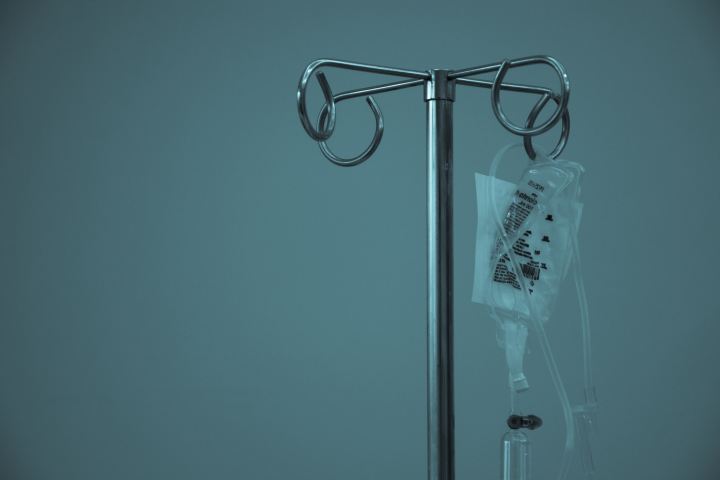THE CONVERSATION
Don’t believe the Gwyneth Paltrow IV hype – intravenous therapy is not a shortcut to good health

Injecting anything straight into your bloodstream comes with big risks, especially if those administering the drips aren’t medically trained.
Actor and businesswoman Gwyneth Paltrow declared “I love an IV!” recently, calling herself an “early adoptor” of intravenous infusion during a podcast. Both she and the show’s host were hooked up to drips during an interview in which they discussed bone broth, skipping meals and infrared saunas.
The Goop boss has been criticised for her “beauty from the inside out” ideas, which she says are helping her recover from long Covid and reduce inflammation. Lots of TikTok users are not having it – but IV supplements have hit the mainstream in recent years. Here’s why they are not a quick fix and can be deadly.
What is IV vitamin therapy?
IV vitamin therapy administers supplements directly into the bloodstream via a needle inserted into a vein. Fans of the therapy believe this route leads to higher nutrients in the body compared with oral supplements or food-based nutrients as it avoids nutrient losses through digestion and excretion.
Providers of these injections say they customise the formula of vitamins and minerals depending on the patient’s perceived needs. Many do this without an initial blood test, making it close to impossible to know if you have a pre-existing vitamin deficiency. A typical session in a shopfront or home visit can take 30–90 minutes and cost anywhere between A$80 to $3,000.
Popular drip “cocktails” include blends of vitamin C and B complex “for energy”, B complex and zinc “for skin”, vitamin C, magnesium and amino acids “for happiness”, and a supposedly “anti-ageing” blend of glutathione. Many of these contain mostly water-soluble vitamins C and B, which are processed by the kidneys and excess nutrients excreted through urine when the body has received the amount it needs to work properly.
View this post on Instagram
What does the science say?
IV therapy is not new and has been used in the medical profession for decades. In hospitals, it is used to hydrate patients and administer essential nutrients if patients have difficulty eating, drinking or absorbing them. Single nutrient deficiencies like vitamin B12 or iron are often treated with infusions under medical supervision.
The “cocktails” that IV vitamin therapy clinics create and administer are not supported by scientific evidence. There have been no clinical studies to show vitamin injections of this type offer any health benefit or are necessary for good health.
Very few studies have looked at their effectiveness in adults. In those that have, they are either of very poor scientific quality, found no significant differences and involved only a handful of people, were missing a placebo group, or contained only anecdotal evidence from single cases.
What’s Gwyneth on about then?
Paltrow recently shared her enthusiasm for glutathione as her favourite IV vitamin therapy.
Glutathione is heralded as the “master antioxidant” in the body and is naturally produced by our cells, working to prevent oxidative stress and tissue damage. The body’s demand for this nutrient is believed to increase as we age. Studies have reported that taking an oral glutathione supplement doesn’t increase blood levels in humans.
In 2015, a trial reported some beneficial effects on immune function with long-term glutathione oral supplementation, but the authors said more studies were required to further understand the nature of these effects. It is important to note that no research has supported the claim IV therapy with glutathione slows down ageing or reduces oxidative damage.
What could go wrong?
Injecting anything straight into your bloodstream comes with some big risks, especially if those administering the drips aren’t medically trained.
Medical doctors tend to avoid inserting IV lines into people unless it’s absolutely necessary (such as for medical emergencies). Air bubbles (or embolisms) accidentally introduced via IV can be fatal.
Another major risk is hypervitaminosis, or consuming too high a dose of a vitamin. Unusually high stores of vitamins in fat tissue can, over time, cause problems like Alzheimer’s disease, cancer, kidney issues, muscle spasms, pain, burning and itching.
And any time you have an IV line inserted, it creates a direct path into your bloodstream and bypasses your skin’s defence mechanism against bacteria. This can put you at risk of dangerous systemic infection.
IV therapy also puts your wallet at risk. If you are not vitamin deficient, supplements (oral or infused) may just create very expensive urine. (…)
Don’t believe the hype
While it sounds logical that consuming more of a good thing would be good for you, research shows this is not necessarily the case. In a healthy person, nutrient digestion and absorption are carefully regulated to release them into the bloodstream from the gut and liver. Excessive amounts of nutrients entering the bloodstream without undergoing this process may result in harm, and the long-term consequences remain unknown.
Most of us are far better off trying to get vitamins and minerals by eating a balanced diet with a wide variety of vegetables and fruits. It’s also much easier, cheaper and safer. DM/ML
This story was first published in The Conversation.
Emily Burch is a dietitian and researcher, and lecturer at Southern Cross University. Lauren Ball is a Professor of Community Health and Wellbeing at the The University of Queensland.




















Comments - Please login in order to comment.